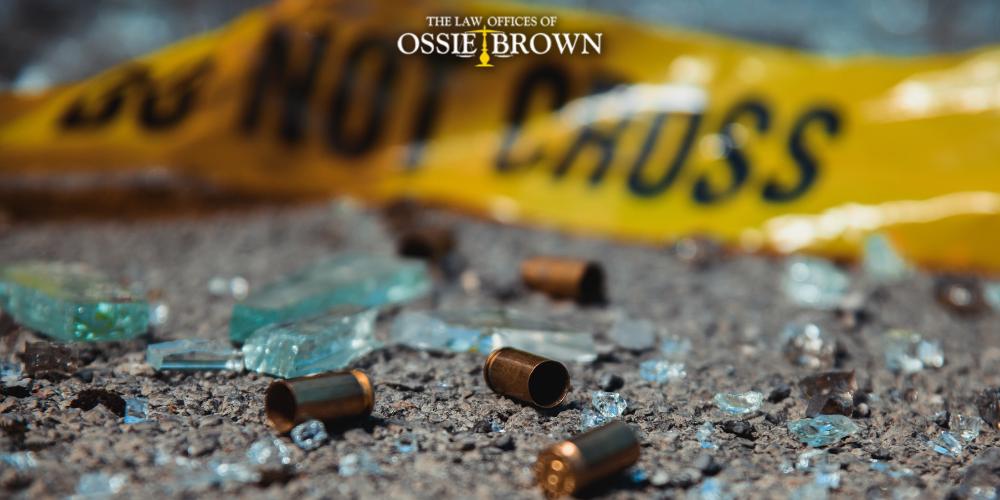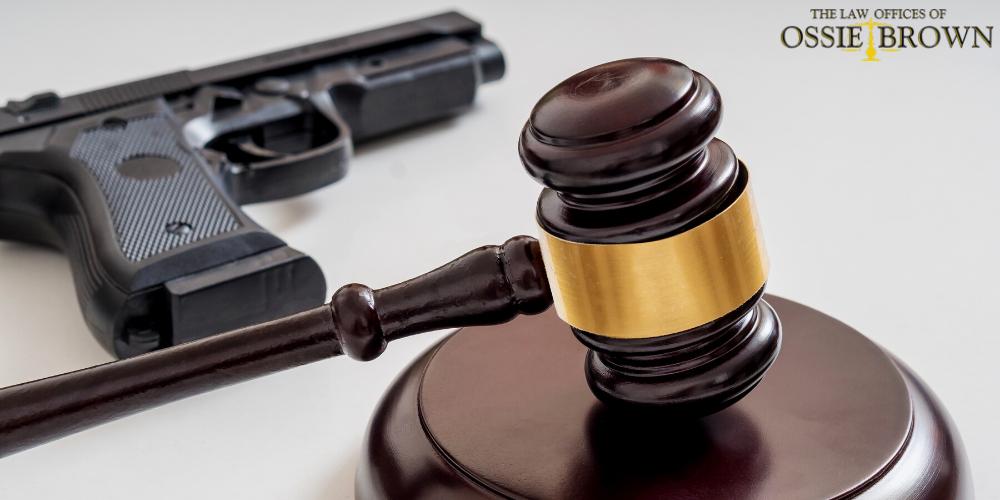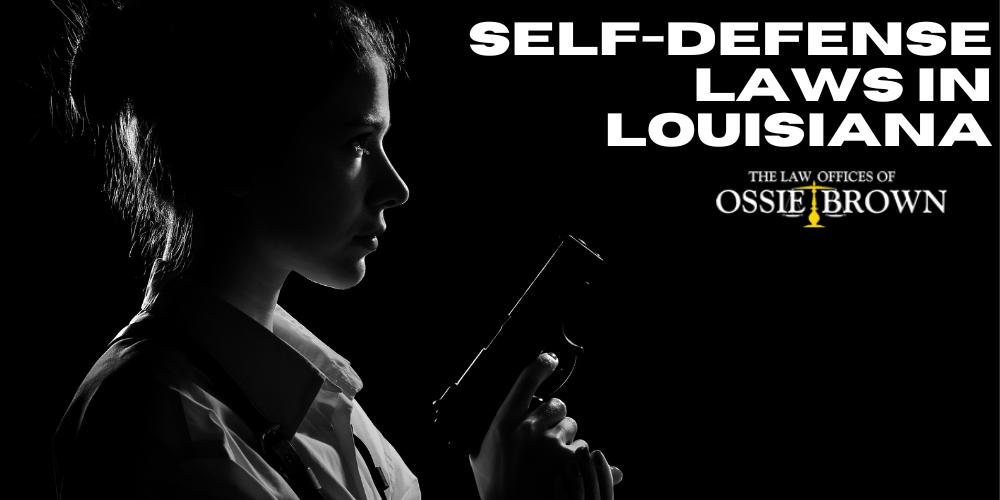In every state and country in the world, purposely using lethal force is against the law, unless it was committed for the sake of self-defense. But without strict stipulations, almost any serial killer out there could claim self-defense and get away with it. Self-defense laws in Louisiana are designed to fix this problem. Below, we break down all the self-defense laws in our state that you need to know, including the Castle Doctrine and the Stand Your Ground law.
If you’re facing a homicide charge after defending yourself or preventing a forcible felony involving life or great bodily harm, you need strong legal representation on your side. Baton Rouge criminal defense lawyers at the Law Offices of Ossie Brown have what it takes to protect your legal rights and help you achieve the best case outcome possible. Call 225-343-1111 to schedule a free consultation at our law firm today.
What is Self-Defense?
Self-defense means that a person is protecting themselves from serious danger by using force or violence. For example, a homeowner may feel the need to use force or violence to protect themselves from an armed unlawful intruder.
Self-defense is a very common legal defense used in a variety of violent crime cases. However, it’s difficult for courts to determine the validity and truthfulness of the defense, because technically anyone could hurt someone and claim they were defending themselves from danger. In order to determine whether self-defense was necessary and/or lawful in a violent criminal case, most states will ask the following questions:
- Was there imminent threat of harm?
- Was there reasonable fear of harm?
Imminent Threat of Harm
Imminent threat of harm means that someone reasonably believes that suffering great bodily injury or death is a certainty. The belief of imminent danger could result from a verbal threat, such as: “If you don’t do XYZ, then I’m going to kill you.” They may or may not have a deadly weapon on hand, such as a knife or a gun. Or, the belief of imminent injury or death could result from an active physical altercation, with or without weapons.
In order for self-defense to be lawful, the imminent threat of harm must be active and ongoing. For example, if the person committing an attack stops the attack and leaves the premises, then there is no longer an imminent threat of harm. If the victim were to use force or violence after the threat has ended, then most courts would consider this as retaliatory, not self-defense.
Reasonable Fear of Harm
In order for self-defense to be lawful, there must have been a reasonable fear of harm. This means that any reasonable person in the same situation would have perceived the attacker’s words or actions as an imminent threat and responded in a reasonable and proportional way.
For example, let’s say Person 1 punches Person 2 in the face. Person 2 then responds by pulling out a gun and shooting Person 1. Many courts would argue that Person 2 did not respond reasonably or proportionally, and their use of force (shooting a gun) was not justified.
Here is an example of a proportional, reasonable belief of harm: a burglar breaks into a home armed with a gun. When they see the homeowner, they begin firing their gun in the homeowner’s direction. The homeowner responds by shooting back in order to protect themselves and their family.
Imperfect Self-Defense
The question of reasonable fear of harm raises the point that not everyone can be considered a reasonable person. In other words, some people will naturally feel more threatened than others in a given situation, especially if they tend to have high anxiety levels, a history of trauma, or some kind of mental disability.
So there are some situations where a victim feels threatened and defends themselves in an unreasonable and unproportional way. This is called imperfect self-defense. Imperfect self-defense is not always lawful, depending on the exact circumstances. However, a person convicted of imperfect self-defense can receive less serious charges and penalties.
What is Justifiable Homicide in Louisiana?
Louisiana law (RS 14:20) states that lawful, justifiable homicide is the death of a person that occurs out of self-defense. Louisiana considers homicide as justifiable when:
- It is the result of self-defense by someone who believes they’re at risk of dying or receiving great bodily harm, and they believe that the use of deadly force is the only way to save their life.
- It is committed in order to prevent a violent or forcible felony involving danger to life or catastrophic injury. The person must believe that the use of deadly force is necessary to prevent the violent act. Additionally, the dangerous or violent situation must be enough to create fear of death or injury in a reasonable person.
- It is committed against a person that the perpetrator believes was likely to use deadly force in a home, place of business, or a motor vehicle.
- It is committed against a person who is committing or attempting to commit a theft crime within a home, business, or motor vehicle.
It’s important to note that none of these provisions matter if the homicide occurred during the acquisition, distribution, or possession of a controlled dangerous substance. Additionally, Louisana felons owning and using a gun for self-defense purposes are subject to charges for applicable offenses under Louisiana law.
What is the Louisiana Castle Doctrine?
The Louisiana Castle Doctrine states that a person may use deadly force against someone who has committed an unlawful and forcible entry into their personal property, whether that be their home, motor vehicle, or shed, for example.
The Castle Doctrine is included in Louisiana’s justifiable homicide law. It states that a person lawfully inside their own property when a conflict begins may use deadly force against someone who is committing or attempting unlawful entry into their property. The person must believe that use of deadly force is necessary to protect themselves, make the intruder leave the property, or prevent unlawful entry thereto.

What is the Stand Your Ground Law in Louisiana?
The Louisiana Stand Your Ground law (RS 14:19) is similar to the Castle Doctrine. It states that a Louisiana resident has the right to stand his or her ground and use deadly force against a person who forcibly entered their home, motor vehicle, or place of business, and is likely to cause great bodily harm or death.
Stand Your Ground laws in most states, including Louisiana, remove a person’s “duty to retreat” from a dangerous or violent situation, especially if they are legally allowed to be there. In other words, some states mandate that people in imminent danger should attempt to flee the situation before using force or violence to protect themselves, even if they are lawfully inside their place of business or personal property. Louisiana removed this “duty of retreat” law several years ago.
The main difference between the Castle Doctrine and the Stand Your Ground law in Louisiana is that the former legally allows the use of deadly force inside one’s “castle” (AKA: their personal property). Meanwhile, the latter mandates that someone is legally allowed to “meet force with force,” as long as they have the right to be where they are. For example, if a person is in imminent danger at work, they have no duty to retreat because they have every right to be at work. Therefore, they can meet force with force if they have a reasonable belief that someone’s unlawful activity will result in great bodily harm or death.
Proving Self-Defense in Violent Crime Cases
As you can see, defending yourself with lethal force in Louisiana comes with countless stipulations. It takes an experienced criminal defense attorney to carefully examine the exact events during a violent encounter and prove that someone was, in fact, defending their life, even if they truly were. It’s easy for the details of a completely justifiable homicide to get twisted or muddied, and an innocent person to end up behind bars as a result.
Baton Rouge violent crimes defense lawyers at the Law Offices of Ossie Brown have extensive knowledge of self-defense laws in Louisiana. Not only that, but we have extensive experience in defending Louisiana residents from all sorts of violent crimes such as homicide, aggravated assault, and domestic violence. In order to give you the best case outcome possible, we can help you prove the following elements of justifiable homicide:
- The attack was unprovoked.
- You reasonably believed that an imminent threat of harm existed.
- You had a reasonable fear of harm.
- And finally, you used a reasonable and proportionate degree of force.

Call Baton Rouge Criminal Defense Lawyers at The Law Offices of Ossie Brown Today
If you’re being accused of using unlawful force in order to protect yourself or prevent a violent or forcible felony, you need to hire strong legal representation. Baton Rouge criminal defense attorneys at the Law Offices of Ossie Brown can help you prove the necessary elements of a self-defense claim in Louisiana. Call 225-343-1111 to schedule a free consultation with our experienced legal team today.


